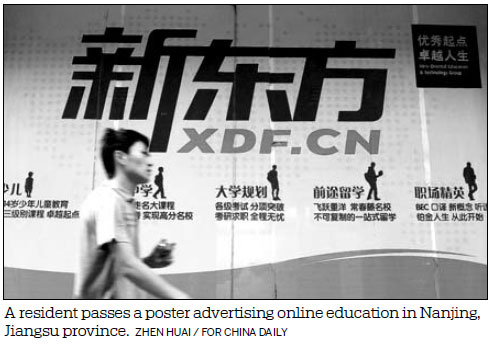Online education facing new copyrights contest
Haidian District People's Court in Beijing ruled in favor of Koolearn Technologies Holding Ltd in a copyright case earlier this month, bringing competition for copyrights in the online education market into sharp focus.
The court ordered China Online Education Group, more commonly known as 51talk, to pay the Koolearn 240,000 yuan ($35,780) in damages as well as 6,600 yuan in legal expenditure.
The case involving the two leading online education service portals can be traced back to the end of 2016, when Koolearn found 51talk was selling its educational materials at 51talk's flagship store on Tmall, a major online market in China, at cut down prices.

The products included an array of English-learning videos, whose copyrights were owned by Koolearn.
As a result, about a year later, Koolearn filed a copyright complaint against 51talk and Tmall, claiming nearly 1.27 million yuan in damages, Beijing Business Today reported.
The court said that the evidence presented by Koolearn could not form a complete chain of evidence to prove that 51talk had gained from the unauthorized sales of the English-learning videos.
Yet what 51talk had profited from was not limited to the sales proceeds, the court noted.
The low-priced videos had attracted more traffic to the platform, which needed to be factored into the calculation of the damage, the judges said.
Facing increasingly fierce competition in the online training market, players are scrambling for high-quality copyrights, as well as more users and training resources, industrial observers said.
The rivalry for copyrights concerning core educational content is likely to become a focus of the competition among educational dotcoms, Cheng Ziying, a partner of an educational industrial fund at Cybernaut, told Beijing Business Today.
Online education companies consider their user traffic and copyrighted content as key to their market expansion. At the initial stage of their development, user traffic is a focus, but after the companies have matured, they will turn their attention to copyrights, industrial observers said.
In the language training field, brand reputation is a key consideration that can affect parents' decisions to subscribe to a particular online service.
Thus, the companies endorsed by noted publishing houses and brands of overseas textbook series will be more attractive to online users, industrial insiders said.
Many of the online education service providers have invested heavily in the copyrights for overseas language training books and videos, according to Beijing Business Today.
Increasing the protection of intellectual property is an inevitable path that online education service providers will follow, after their businesses develop to a certain stage, the Beijing-based newspaper quoted Lyu Senlin, founder and chief researcher at the Learneasy Times Online Education Research Institute, an industry research consultancy, as saying.
Copyright is the foundation for online education and key to the sector's healthy growth, industrial insiders said.
Zhi Hui, founder of DaDa, an online English training institute, told news portal iYiou that the sector needs to protect IP to achieve sustainable growth.
"Only after creating a copyright-friendly environment can we ensure that it is commonplace for children to use authorized textbooks," she said.
A white paper on China's online education market, released last year by mobile internet industry consultancy iiMedia Research, forecast that the number of online users of education services will reach 296 million in China next year.
They are estimated to form an online education market worth 433 billion yuan by then, according to the report.
(China Daily 04/18/2019 page17)














